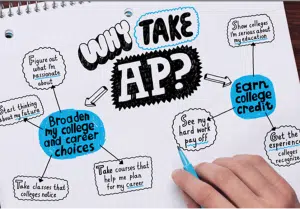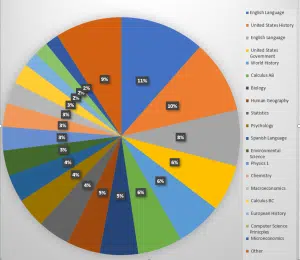Advanced Placement (AP) courses and exams
If you have advanced skills in subjects like science, math, english, social sciences, chemistry, art history, foreign language, and even music theory, then you should consider taking one or more of the advanced placement (AP) subject exams.
Every high school in the US is required to offer at least 4 AP courses and exams, but there are specific high schools which also offer courses and exams ranging 23 different subjects. Most of the top-ranking universities accept applicants who have exemplified more than just an interest in a subject during their time in high school. Admissions committees are looking to see that you went the extra mile to take a college level course in the subjects you are interested in.
The AP tests and courses are your opportunity to show your commitment and drive towards your given studies. AP exams are created by the same individuals who designed the SAT, which means the tests will involve multiple choice and essay questions. The exams are held at the end of the year after you have completed the AP course.
Is there a difference between an AP exam and AP course?
Yes. An AP exam is offered at the end of the year in May for a given subject, and the exam can actually be taken without taking the AP course. An AP course is a semester long honors type of class offered through high schools listed on this site. If you are taking the AP exam without taking an AP course then it is important to understand the structure and format of an AP exam by reviewing the CollegeBoard site and speaking with faculty at your high school.
Do AP exams and courses affect my GPA?
AP exams do not affect your GPA, but AP courses do get weighted with your GPA because it is a considered the same as taking an honors class at your high school. For example, getting an A in a AP course is 4.0 unweighted, but 5.0 weighted. This means taking an AP course can help you earn a higher GPA.
What is a good vs bad AP exam score?
The top score for an AP exam is a 5. Earning a 4 or 5 on an AP exam is really the only way to help your case for college admissions. If you score a 3 it is considered average, and anything less than a 3 you have failed the exam.
What happens if I fail an AP course or exam?
First look over your summary report to understand what the issue was for failing the exam. Then speak to your class room teacher if you earned a 1 or 2 on exam to see if it’s still possible to earn classroom credit. In some cases, you can still earn a little credit on your transcript but the situation varies depending on the individual.
If you fail the exam but took the course you have the choice of whether you want to send your scores to the university you are seeking to attend. However, if a college admissions advisor sees you have taken AP US history, but did not send in your AP scores this could reflect badly on your application. If you fail the AP course itself there may also be a need to make it up over the summer. It is important to secure a tutor to improve the areas you struggled with on the exam before the following year.
Is there a specific AP subject recommended for me to take?
Yes. It is good to take at least AP courses which correspond to introductory and primary courses like history, science, foreign languages. However, if you have a specific career goal for what you want from your college education then it is recommended you take that specific AP course. So if you are looking to become an engineer, taking the AP physics 1 or AP physics 2 will help to show your dedication to your field when your transcripts are being reviewed by a college admissions committee.
 Can AP courses and exams count towards college credit?
Can AP courses and exams count towards college credit?
Yes. In some cases, scoring well on an AP course and corresponding exam can eliminate the need for taking certain foundation courses typically required for first years at the university you will attend. Eliminating the need for foundational courses can allow you to use the best of your tuition funds to dive right into your specialization.
How many AP classes should I take?
Typically, we recommend striving for the National AP Scholar award if possible, which really means 8 AP’s by the conclusion of the junior year. Certainly, this is a high bar to achieve, but it would help you stand out in the college admissions process. At the very least, we recommend trying for AP Scholar with Distinction (5 AP’s) by the end of the junior year.
The AP classes demonstrate the rigor of your courseload. This is a rough benchmark for you to follow as you navigate your high school years. With admissions at all time lows, you need to be a strong as you can possibly be in terms of your academic and extracurricular profile to get into a top university, especially the Ivy League.
In addition, the senior year AP courses help to reflect the continued rigor of your course load and desire for academic challenge. But keep in mind that you will not get the AP scores in time for colleges to consider, as the results will already be out by end. That’s why it’s important to get all those AP scores in by the end of junior year.
If you can handle a rigorous, and hefty academic load on top of your daily obligations outside of school then you should consider signing up for all the AP classes offered might work for you. However, if you have a lot of extracurricular activities like sports, drama, debate club, student council, or if you participate in volunteer work, then stacking a full workload of AP courses might not be the best option for you.
You want to make sure that whatever AP courses you take fits with your schedule and can be managed along with the other time-heavy obligations involved in the college enrollment process like essay writing, applications, studying for the SAT, etc. While top universities do want to see that an applicant is an overachiever, they also want ensure that you are the type of overachiever who knows how to establish a balanced curriculum.
How many high school students are taking AP exams?
The CollegeBoard reports that in 2018 a total of 4.22 million AP exams were taken, and of the total of public high school graduates 38.9% of students took at least one AP exam. Over the last 10 years the need for AP exams and courses to get into colleges has increased from 752,255 total students in 2008—to 1,242,990 students by 2018. However, of the high schools students who took AP exams in 2018 only 749,938 scored a three or higher, meaning only 6% of students who took the exam were able to pass it. This is where you as an applicant will standout to Ivy admissions groups.
Research shows that students who completed AP courses and exams in high school prior to entering college were more likely to earn higher GPAs in college, were more likely to graduate in 4 years, saved money on tuition, and have higher graduation rates than students who never took AP courses in high school. AP scores can also compensate for a lack of high profile academic competitions if you haven’t had the chance to strengthen your application by competing in subject specific events like the US Math Olympiads, International Science and Engineering Fair (ISEF), or Scholastic Arts and Writing Awards.
How can I increase my chances of getting a good AP score?
AdmissionSight is here to help enhance your chances of enrolling, and doing well on AP exams and AP courses. We can also assist with the essentials of your common application, essay editing, extracurricular work, and college interview preparation. Learn from our expert college admissions consultants who will help boost your chances of standing out during the college admissions process.
College admissions committees from MIT to Harvard are all looking for applicants who made the most of their high school years by advancing their skill sets and taking on challenges like the AP courses and exams. The drastic increase in high school students who are taking the AP test show how competitive the colleges admissions process have become. If you leave AP exams and courses off your high school curriculum it’s likely you will not be considered a candidate for admission to an Ivy League university like MIT, Havard, Princeton or Yale.
In addition, you can easily pull up the average GPA and ACT scores of competitive universities, including the Ivy League that meet those criteria, but you can still be very far from getting accepted. Given how competitive it is in this day and age, GPA and ACT scores only scratch the surface. You need to take advantage of the academic and extracurricular opportunities out there to truly stand out, and that includes national competitions and leadership activities. College admissions isn’t a black and white process, but in theory you want to take advantage of all aspects to truly maximize your odds of acceptance.
Below are some of the top universities admission expectations of AP exams and scores and what university credit they may possibly count towards. You can also use the search engine provided by CollegeBoard to see if your AP exams and courses could qualify for college credit. We have also provided a list of the 38 subjects of AP exams currently offered in 2020. To see which of the subject exams your high school offers these exams and courses please visit the CollegeBoard website.
| East Coast Schools | accepts scores of 4 or 5 to enroll in chemistry |
| Brown University | accepts AP credit scores of four and five |
| Carneige Mellon University | |
| Colombia University | accepts AP scores of 5 (and rarely 4) for course credit |
| Cornell University | accepts AP scores of 3, 4, & 5 for course credit |
| Dartmouth University | accepts scores of 4 and 5 on the AP exams for credit |
| Georgetown University | accepts AP scores in lieu of Subject Test scores |
| Harvard University | only accepts AP scores of 5 for course credit |
| John Hopkins University | accepts scores of 3,4, & 5 on the AP exams for credit |
| MIT | only accepts score of 5 on the AP exams for credit |
| New York University | scores of 4 and 5 on most examinations |
| Princeton University | accepts AP scores of 5 (and rarely 4) for course credit |
| Yale University | accepts scores of 4 and 5 on the AP exams for credit |
| West Coast Schools | |
| Stanford | accepts AP scores of 3,4, & 5 for course credit |
| University of California, Berkeley | accepts AP scores of 3,4, & 5 for course credit |
| University of California, Los Angeles | accepts AP scores of 3,4, & 5 for course credit |
| University of Southern California | Accepts AP scores of 4 or 5 to get 4 units of credit |
| Southern Schools | |
| Emory University | more than four acceptable AP scores may receive a course waiver |
| Vanderbilt University | awards college credit for a score of 4 or 5 on an AP exam |
| Midwest Schools | |
| Chicago University | accepts scores of 4 & 5 on the AP exams for credit |
| Northwestern University | accepts scores of 3, 4 & 5 on the AP exams for credit |
On average, we encourage our students to try to study for 3–4 hours per day to do well in high school, which should be enough to tackle AP classes, SAT exams, etc. if you manage your time efficiently.
However, if you want to do well on any of the tougher competitions such as the Math and Science Olympiads, that will certainly take more preparation, something closer to 6–8 hours per day. There’s a significant jump between just studying for your standard high school stuff (courses, AP, SAT exams) vs. doing well and placing top 500 or semifinalist in any of the national academic competitions.
At AdmissionSight, we believe taking more AP courses will increase your odds of acceptance, but at the end of the day it is just one of many factors that play into the college admissions process. If you truly want to maximize your odds of admission, you will need all of the stars to align, including crafting together a compelling application to win the hearts of the admissions committee.





 Can AP courses and exams count towards college credit?
Can AP courses and exams count towards college credit?































